The Monkees griped & griped that they had no control over their music, their image, their anything. A "product" of producers & businessmen & image-inventors, our four lads couldn't cope with a type of fame that never required them to be talented. Yet they well knew (or strongly believed) they were talented & wanted the chance to prove it.
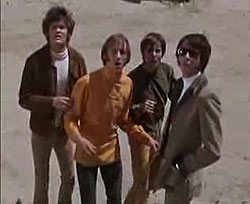 The more they balked at being puppets, the closer they came to the end of a very good run. When it was essentially all over, they set out to make a movie that showed what the Monkees could've been if they'd had more say-so in both their comedy antics & their music. The more they balked at being puppets, the closer they came to the end of a very good run. When it was essentially all over, they set out to make a movie that showed what the Monkees could've been if they'd had more say-so in both their comedy antics & their music.
Liberated for their personal brand of comedy turned out to mean a reliance on rejected jokes or out-takes from Cheech & Chong movies, comingled with cliche pyschedelic cinematography.
The title Head (1968) as in pot-head meant it was a tale in praise of drug use, which certainly alarmed folks of the time who had gotten used to the Monkees' innocent bubblegummer style. And fact is, hippies & potheads were so demeaned in cinema generally as psychopaths or self-destructive delinquents, when in the real world they were just kids, it might have been moderately revolutionary just to treat it all as pleasant fun.
But the older teenagers had no interest in the Monkees, while the R rating kept the actual Monkees fans out of the theaters. Man did it ever bomb at the box office. That, at least, was the "kind" excuse for the film's commercial failure. The bigger problem, however, just may have been that it wasn't all that funny. Select scenes in small doses might've been funny, but at the original director's cut (shortened after the initial test-audiences balked at being held captive so long) it was a total snooze.
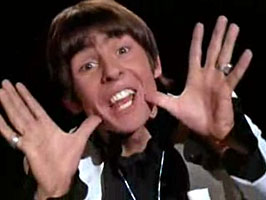 The psychedelia was just commercialism of the time. A veritable army of well-known actors put in cameo appearances. Teri Garr pretends to be dying to get Mickey's attention in the western movie spoof. Victor Mature gets shrunken teency-tiny Monkees lost in the forest of his hair. Frank Zappa with a talking cow shows up after Davy's great "Daddy's Song" routine to rag on Davy for being such a bad singer. The psychedelia was just commercialism of the time. A veritable army of well-known actors put in cameo appearances. Teri Garr pretends to be dying to get Mickey's attention in the western movie spoof. Victor Mature gets shrunken teency-tiny Monkees lost in the forest of his hair. Frank Zappa with a talking cow shows up after Davy's great "Daddy's Song" routine to rag on Davy for being such a bad singer.
Sundry film genres get spoofed, but each sequence is rather stand-alone, & the movie seems interminably long because the slim plot-thread means provides no forward momentum. It's basically a collection of short subjects.
The script, if it qualifies for a script, was based on idea sessions by the Monkees vacationing with director Bob "Five Easy Pieces" Rafelson & Jack "Five Easy Pieces" Nicholson. And yes it's st range to realize the young Jack Nicholson in his toking youth was not hip enough to hang out with better bands.
It was a stoner vactation & everyone was high as kites. So of course they were all convinced their every notion was just hysterically funny, though none of it was. Rafelson later transformed these sessions into a script full of disconnected psychedelic sketches, a script co-credited to Nicholson for contributing so many of the lame ideas.
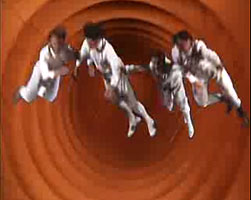 Except for Peter Tork who just tried to get along with everyone, the band members thought they should get a writing credit, too, since a lot of the ideas were theirs. Never mind they didn't write the final script; neither had Jack & he got credited. Except for Peter Tork who just tried to get along with everyone, the band members thought they should get a writing credit, too, since a lot of the ideas were theirs. Never mind they didn't write the final script; neither had Jack & he got credited.
Their dope-slowed brains also believed they should get partial directorial credit though they didn't direct themselves. They were promised only song-writing credit (they didn't write much of the music either, & given the way credits were aportioned, the three songs that do have Tork or Nesmith credited may or may not have been primarily their compositions). Not getting credited for everythign ticked them off, so they threatened the entire shoot with a walk-out. Except for Peter.
Quite rightly thereafter Rafelson no longer regarded them as friendly companions & cared a lot less if they came off well. So the artificial rock band given their chance to prove their native worthiness instead proved themselves misguided & greatly in need of that jettisoned staff that had made them look & sound good as a studio creation for their tv series.
Imbedded in the film here & there are satiric comments on their experience as America's transiently biggest act & their lack of freedom to do what they wanted. But this amounts to whinging, & the comedy is inferior to the tv show's simpleminded slapstick, the music (some of it pretty good) really only of interest only to love-blinded die-hard fans of the group.
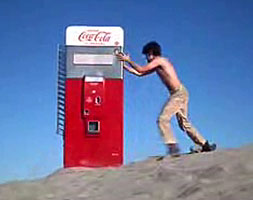 Instead of launching themselves into an independent career as an authentic rock band, Head turned out to be the nail in the coffin. Instead of launching themselves into an independent career as an authentic rock band, Head turned out to be the nail in the coffin.
Yet the music wasn't all terrible, having included material by Harry Nilsson & Carole King. And though the Monkees with moderate musicianship did play some instruments, they were dressed up by Stephen Stills & Neil Young so that it wouldn't sound amateur.
The songs, though uneven, in the main stood up well to the best by Boyce & Hart for the tv show, & the parody they sing of "Hey Hey We're the Monkees" is mildly amusing in its desire to deconstruct a myth. A couple of the songs actually have an underlying sophistication, in spite of their imitative spirit.
Harry Nilsson's remarkable "Daddy's Song" sung by Davy Jones (dancing beautifully) is a bouncy bubblegummy tune musically, but with fairly serious lyrics, which Nillson said was secretly about childhood rape but overtly about less sinister but still distressing family dysfunction. This is a great couple of minutes of filmmaking & performance.
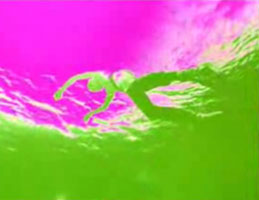 Mickey Dolenz on Carole King's "Porpoise Song" is a lovely stand-alone video showing Mickey drowning amidst mermaids, to a psychedelic look & sound, musically imitating John Lennon's "Strawberry Fields." Mickey Dolenz on Carole King's "Porpoise Song" is a lovely stand-alone video showing Mickey drowning amidst mermaids, to a psychedelic look & sound, musically imitating John Lennon's "Strawberry Fields."
There's a widespread sentiment by aging Monkees fans that Mike Nesmith was the only talented Monkee because he "invented" the music video before the advent of MTV.
But this is largely a myth, & many stand-alone segments of the television series, just like "Porpoise Song" imbedded in Head, perfected what Nesmith in his post-Monkees attempts at an independent career merely copied without additional innovation.
Crummier is Peter Tork's ditty "Do I Have to Do This All Over Again," which uses inconsequential psychedelic imagery. Mickey singing "Can You Dig It" -- arranged again as Beatles psychedelia -- is shown puffing a hooka in a harem; it could've been a minor sequence even for the tv show.
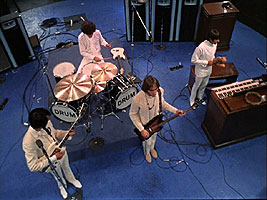 Mike Nesmith's lyrically trivial "Circle Sky" brings a Tex-Mex sound to the a stage performance, instrumentally simple enough that the Monkees seem really to have been for once the primary musicians. Mike Nesmith's lyrically trivial "Circle Sky" brings a Tex-Mex sound to the a stage performance, instrumentally simple enough that the Monkees seem really to have been for once the primary musicians.
The "happy" lyrics sung on a stage to the screaming of standard Monkees fans is intercut with images of wartime Vietnamese, to try to give the song irony. But the tune is nowhere near good enough to sustain any pretense of weight.
In some ways even the most parodic songs achieve what the Monkees' slapstick antics in the non-music sketches failed to support, providing a bridge from children's rock 'n' role to the "young adult" world. That songs & skits are frequently psychedelic in nature has gotten this catagorized, by people who manage to like it, as the best psychedelic film of the 1960s. And given how awful psychedelic films tended to be for the Z-pic grindhouses, Head might indeed be best of a bad lot.
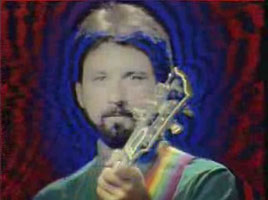 Some while after our dearly beloved & artificially created super band The Monkees was dead & buried, there was a lingering sentiment in the air that Mike Nesmith at least might secretly be a music & comedy genius if he could get away from all that artifice to "do his own thing."
Some while after our dearly beloved & artificially created super band The Monkees was dead & buried, there was a lingering sentiment in the air that Mike Nesmith at least might secretly be a music & comedy genius if he could get away from all that artifice to "do his own thing."
Elephant Parts (1981) is a strung-together group of music videos &am comedy bits. They tend to be pretty similar to the material on the television series & in Head, i.e., largely just silliness. It certainly can entertain. But some of us who long held a belief that he was smarter & more creative than anyone else might be a little disappointed.
His video work many have regarded as the starting-point for what became the MTV brand. This desire to credit Nez with more than his due doesn't hold up to scrutiny. What one sees is pretty much the same style used to illustrate song from Head, for which "Porpoise Song" provided an especially good couple of minutes for Mickey Dolenz.
When the very uneven patchwork film starring just himself without the other three Monkees appeared as Elephant Parts, many who were enamored of the former band, & wished some part of them would stick around a little while longer, well, we pretty much fell for Nesmith's shtick hook line & sinker.
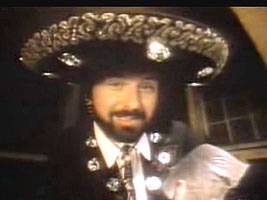 The later unavailability of Nes's videos meant that they grew in significance in the imagination. Lingering rumors of genius turned out mostly to be nostalgia speaking; & as nostalgia there's no denying the charm of Elephant Parts. The later unavailability of Nes's videos meant that they grew in significance in the imagination. Lingering rumors of genius turned out mostly to be nostalgia speaking; & as nostalgia there's no denying the charm of Elephant Parts.
Though it may not be true that Nez was an innovative videographer, he at least dates to the time of the pioneers pre-MTV. Elephant Parts on less than a shoestring budget puts visuals to some decent songs Nez wrote for his post-Monkees album Infinite Rider on the Big Dogma.
We begin with Nez singing a parody of his best song from the tail-end of his Monkees days, his homage to his beloved wife, "Joanne," a nice piece reminiscent of Leonard Cohen. Nes's original lyric began "Her name was Joanne and she lived near a meadow by a pond." In the parody it becomes "Her name was Rodan/ And she lived off the ocean of Japan," which uses up all the wit he had that day as the song ends. Toy houses are stomped by a monster-foot.
This is amusing in the manner that the Monkees television show was amusing. And while there will be more amusing bits to come, by & large the comedy is never the equal of the music, but has the effect of trivializing the songs.
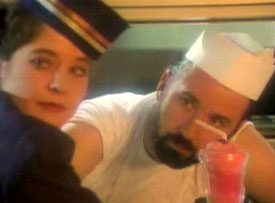 We next see Nez doing poor stand-up comedy, the joke being, apparently, that none of it is very funny. Eventually we get a complete music video that should be judged as a separate little film. "This Night is Magic" deserves its position as a brilliant music video of a still-forming genre. We next see Nez doing poor stand-up comedy, the joke being, apparently, that none of it is very funny. Eventually we get a complete music video that should be judged as a separate little film. "This Night is Magic" deserves its position as a brilliant music video of a still-forming genre.
The retro rock tune is effective, Nez's romantically adorable falsetto is in fine fettle, &s visually it's put together with an array of winning fantasy sequences. Nez plays two important roles as a bit of a story unfolds to the music. This little patch of Elephant Heads is exceedingly sweet.
By & large the comedy bits that separate rather than connect the various music videos are tiresome reminders of 1960s Monkees shtick. But the music videos themselves hold up, & it's only too bad there's more bad comedy than good music.
My least favorite piece was probably "Cruisin," mainly a spoken-word story-song that begins "Lucy & Romana cruise into the jungles of L.A." It's definitely funny if you take in the whole story of two Valley Girl hotties & muscle-bound street entertainer/vendor Sunset Sam, but as a music video it's trivial. Although to be honest, when I went back to hear it a third time, the song had greatly grown on me, & the visual antics did appear to illuminate the lyrics.
More instantaneous in its appeal was "There's a Light," an almost western-swing pop tune, very pretty, & a good music video overall. Unhappily, it's imbedded between long patches of comedy either bad or dated or both, & even a good piece of music can be weakened by stuffing it meaninglessly between nonsense.
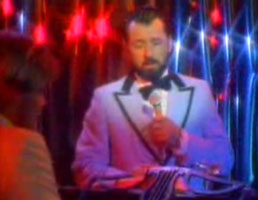 We suffer through a western spoof, a film noir spoof, a horror spoof, a game show spoof, some gay jokes, some druggy jokes, & a Bill Murrayesque set of SNL type bits starting with Nez singing "You must remember this" but forgetting the rest of the lyrics (one of the handful of moments that got to my funny bone). We suffer through a western spoof, a film noir spoof, a horror spoof, a game show spoof, some gay jokes, some druggy jokes, & a Bill Murrayesque set of SNL type bits starting with Nez singing "You must remember this" but forgetting the rest of the lyrics (one of the handful of moments that got to my funny bone).
Remember Head had already spoofed multiple film genres, so once again we see Nesmith not as an innovator, but a changeless continuance of Monkees comedy riffs.
In a little over an hour there's probably ten or fiteen minutes of Elephant Parts that is really good. The rest is a lot worse than I remembered from my youth, & the lingering sense in my heart that Nesmith was the most talented Monkee very nearly evaporated. Nez's contemporary complaints that Monkees commercialism was holding him back wasn't true. Freed of it, he did the same stuff.
As a comedy group I do like still to believe the Monkees are underrated, & did have a bit of the Marx Brothers in them. Nez alone is just one-fourth of the show when it comes to the laughs, & he's brought nothing new to it except his own praiseworthy songwriting. If you like the songs you might prefer to listen to them from the album without the jokey intrusions.
copyright © by Paghat the Ratgirl
|
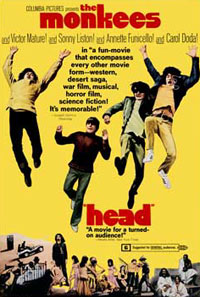
 The more they balked at being puppets, the closer they came to the end of a very good run. When it was essentially all over, they set out to make a movie that showed what the Monkees could've been if they'd had more say-so in both their comedy antics & their music.
The more they balked at being puppets, the closer they came to the end of a very good run. When it was essentially all over, they set out to make a movie that showed what the Monkees could've been if they'd had more say-so in both their comedy antics & their music. The psychedelia was just commercialism of the time. A veritable army of well-known actors put in cameo appearances. Teri Garr pretends to be dying to get Mickey's attention in the western movie spoof. Victor Mature gets shrunken teency-tiny Monkees lost in the forest of his hair. Frank Zappa with a talking cow shows up after Davy's great "Daddy's Song" routine to rag on Davy for being such a bad singer.
The psychedelia was just commercialism of the time. A veritable army of well-known actors put in cameo appearances. Teri Garr pretends to be dying to get Mickey's attention in the western movie spoof. Victor Mature gets shrunken teency-tiny Monkees lost in the forest of his hair. Frank Zappa with a talking cow shows up after Davy's great "Daddy's Song" routine to rag on Davy for being such a bad singer. Except for Peter Tork who just tried to get along with everyone, the band members thought they should get a writing credit, too, since a lot of the ideas were theirs. Never mind they didn't write the final script; neither had Jack & he got credited.
Except for Peter Tork who just tried to get along with everyone, the band members thought they should get a writing credit, too, since a lot of the ideas were theirs. Never mind they didn't write the final script; neither had Jack & he got credited. Instead of launching themselves into an independent career as an authentic rock band, Head turned out to be the nail in the coffin.
Instead of launching themselves into an independent career as an authentic rock band, Head turned out to be the nail in the coffin. Mickey Dolenz on Carole King's "Porpoise Song" is a lovely stand-alone video showing Mickey drowning amidst mermaids, to a psychedelic look & sound, musically imitating John Lennon's "Strawberry Fields."
Mickey Dolenz on Carole King's "Porpoise Song" is a lovely stand-alone video showing Mickey drowning amidst mermaids, to a psychedelic look & sound, musically imitating John Lennon's "Strawberry Fields." Mike Nesmith's lyrically trivial "Circle Sky" brings a Tex-Mex sound to the a stage performance, instrumentally simple enough that the Monkees seem really to have been for once the primary musicians.
Mike Nesmith's lyrically trivial "Circle Sky" brings a Tex-Mex sound to the a stage performance, instrumentally simple enough that the Monkees seem really to have been for once the primary musicians.
 The later unavailability of Nes's videos meant that they grew in significance in the imagination. Lingering rumors of genius turned out mostly to be nostalgia speaking; & as nostalgia there's no denying the charm of Elephant Parts.
The later unavailability of Nes's videos meant that they grew in significance in the imagination. Lingering rumors of genius turned out mostly to be nostalgia speaking; & as nostalgia there's no denying the charm of Elephant Parts. We next see Nez doing poor stand-up comedy, the joke being, apparently, that none of it is very funny. Eventually we get a complete music video that should be judged as a separate little film. "This Night is Magic" deserves its position as a brilliant music video of a still-forming genre.
We next see Nez doing poor stand-up comedy, the joke being, apparently, that none of it is very funny. Eventually we get a complete music video that should be judged as a separate little film. "This Night is Magic" deserves its position as a brilliant music video of a still-forming genre. We suffer through a western spoof, a film noir spoof, a horror spoof, a game show spoof, some gay jokes, some druggy jokes, & a Bill Murrayesque set of SNL type bits starting with Nez singing "You must remember this" but forgetting the rest of the lyrics (one of the handful of moments that got to my funny bone).
We suffer through a western spoof, a film noir spoof, a horror spoof, a game show spoof, some gay jokes, some druggy jokes, & a Bill Murrayesque set of SNL type bits starting with Nez singing "You must remember this" but forgetting the rest of the lyrics (one of the handful of moments that got to my funny bone).